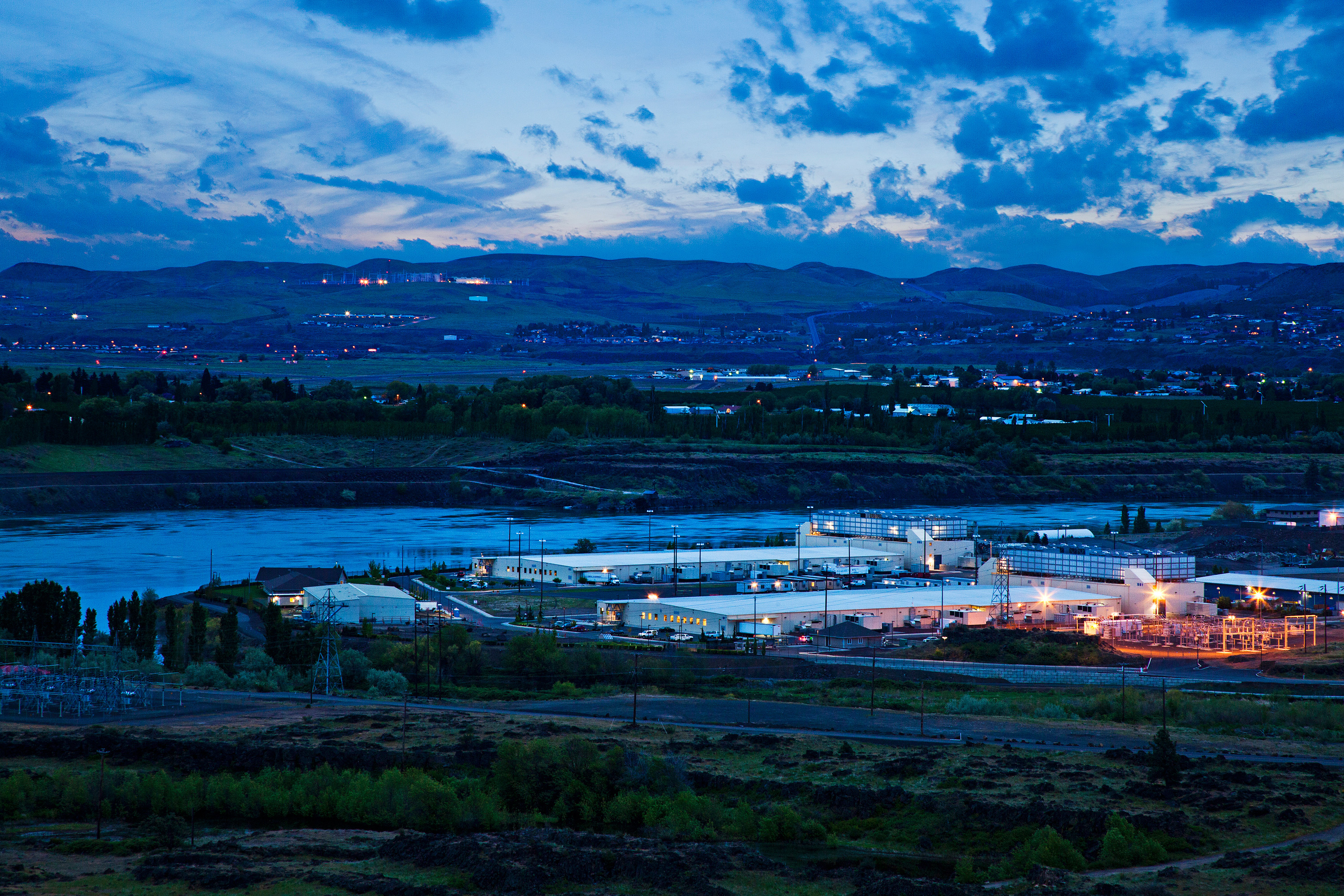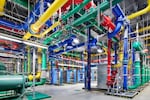
The Google data center in The Dalles, Oregon, was the tech giant's first. Now, the company aims to build another.
Residents of an Oregon city in the Columbia River Gorge are uneasy with tech giant Google’s latest plan to expand in the region.
The company aims to build a new data center on the site of a former aluminum smelter in The Dalles, a port city of about 15,000 people in north-central Oregon. Google built its first-ever data center there in 2006.
The company has negotiated a pair of agreements with The Dalles city officials that would significantly reduce property taxes Google must pay on the new development and secure for the company the water it needs for its expanded operations.
The deal to deliver groundwater to Google has drawn skepticism from members of the public who’ve grown wary of Oregon’s water stability in a changing climate, and that suspicion was on full display at a recent City Council meeting.
Councilor Dan Richardson addressed Mayor Richard Mays and Public Works Director Dave Anderson after details of the agreement were presented to the public.
“I know a number of people have voiced concerns … and you know I share those concerns. Water’s just absolutely critical to our community,” Richardson said at Monday’s council meeting. “As I’ve said to you, Mr. Mayor, and probably to others, this city is an oasis on the edge of a big desert, and the only reason we’re able to thrive here is because of our water supply.”
Companies such as Google, Facebook, Apple and Amazon often site data centers in rural areas close to large population centers. Land and power are cheaper, and smaller cities are typically eager for economic investment. Google claims to have injected about $1.8 billion into The Dalles since the company established its presence there.
Related: Data centers boost Prineville's economy, but not without growing pains
But Google and others have long kept water consumption statistics at data centers and server farms under wraps. The facilities require a lot of water to cool equipment used to store pictures, videos and all kinds of files for internet users.
Some numbers have leaked in recent years that indicate data centers are guzzling water, sullying the environmentally friendly picture tech companies seek to paint of themselves. As the buildings expand in size and number in rural areas across the West, communities like The Dalles have become more critical when big tech comes to town or seeks to expand its footprint.

Multi-color pipes transport water around Google's data center in The Dalles to cool equipment.
Google takes the position that water use at its data centers is a proprietary trade secret. The Dalles city officials signed a non-disclosure agreement with the company forbidding them from revealing exactly how much water Google plans to use at the new development.
“Why cannot we get that information and have it be more transparent?” asked resident Bruce Schwartz, who attended the City Council meeting via Zoom. “It seems pretty uncomfortable to be negotiating with somebody who can just claim trade secrets on all their activities.”
Without offering specifics, The Dalles officials shared some information on Google’s planned water use.
Google owns water rights associated with the former aluminum smelter. The proposed agreement would transfer those water rights to The Dalles, and Google would then pay the standard rate to access the water they need from the city.
“Without this agreement, [Google] or any other industry could use those wells as they wanted just as the aluminum plant previously did,” Anderson, the public works director, told the Council.
Anderson said the amount of water that can be withdrawn from The Dalles groundwater aquifer annually without causing a decline is 5,500 acre-feet per year. Only about 1,800 acre-feet per year are being drawn out of the aquifer currently.
“The requests for water that are proposed in the [Google] development are well below these capacity limits,” Anderson said.
Under the agreement, Google would also pay for some $28.5 million in water infrastructure improvements including a water line, groundwater well and aquifer storage and recovery system.
Related: What we're talking about when we talk about drought
Still, several residents voiced concerns about Oregon’s changing hydrology and whether the water the city is promising to Google will be available down the line. The state designated The Dalles as a critical groundwater area in 1959 after the water table fell to record lows.
“We may have the water rights,” said Dawn Rasmussen, who lives outside city limits and uses a well, “but … if we get into a deficit situation and the aquifer starts dropping, is the city gonna turn off Google?”
“Is there any protection built into this contemplated scenario to protect me if you start pulling those kind of volumes down there and my pump goes dry?” added Vance Ellett, who also uses a well and lives outside of town. “I can’t fight Google. I don’t have the kind of dollars to get into a contest with them.”
Related: The search for solutions to Harney County's water crisis
Anderson responded by saying it’s in the community’s best interest to secure the water rights from Google, rather than leaving them in private ownership.
“And if there are challenges like that, we have a chance to address them,” he said.
A Google spokesperson declined to answer questions on the company’s water use in The Dalles, but sent a written statement.
“We’re proud that Wasco County is home to our first-ever data center,” the statement reads. “And we’re excited that we’re continuing conversations with local officials on an agreement that allows us to keep growing while also supporting the community. As we explore our growth, we’re committed to the long-term health of the County’s economy and natural resources.”
In early September, Google pledged to replenish more water than it consumes at its facilities around the world.
The Dalles City Council plans to vote on the water and tax agreements with Google at its next meeting Oct. 25. Find the meeting schedule and agenda here.
Editor’s note: Dawn Rasmussen previously served on an OPB community advisory board.
